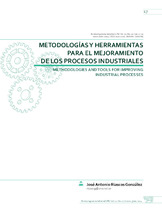Mostrar el registro sencillo del ítem
Metodologías y herramientas para el mejoramiento de los procesos industriales
| dc.contributor.author | Riascos González, José Antonio | |
| dc.coverage.spatial | Seccional Medellín | spa |
| dc.date.accessioned | 2020-11-25T01:38:24Z | |
| dc.date.available | 2020-11-25T01:38:24Z | |
| dc.date.issued | 2014 | |
| dc.identifier.uri | http://hdl.handle.net/20.500.11912/6513 | |
| dc.description | p. 17 - 29 | spa |
| dc.description.abstract | Cada vez son más las empresas que optan por metodologías de mejoramiento de los procesos para buscar su competitividad y proyectarse a los mercados internacionales. Esto se verifica a través de certificaciones, acreditaciones, premios de calidad o la adopción de nuevos sistemas administrativos, como el enfoque por procesos, que tienen como base la satisfacción del cliente interno y externo. Las certificaciones son solo el inicio. Se debe establecer una continuidad para sostenerlas y mejorarlas. En este punto se debe contar con técnicas y herramientas para analizar, medir y mejorar los avances del proceso. Aquí se muestra el empleo de técnicas de mejoramiento de procesos, como las herramientas del seis sigma, y la aplicación de la metodología de aprendizaje basado en problemas ABP. Finalmente se muestra, con base en una investigación formativa, las técnicas seis sigma más empleadas por algunas empresas colombianas. | spa |
| dc.description.abstract | Increasingly there are companies that opt for process improvement methodologies to find its competitiveness and projected to the international markets. This is verified through certifications, accreditations, quality awards, or the adoption of new administrative systems as the approach by processes that are based on the internal and external customer satisfaction. Certifications are only the beginning. A continuity must be set to follow them by holding and improving. At this point it is necessaryto count on techniques and tools to analyze, measure, and improve the progress of continuous improvement. Here it is shown the use of techniques of improvement of processes such as six sigma tools, and the application of PBL problem-based learning methodology. Finally, it is shown a formative research-based techniques most used by some olombian companies six sigma. | spa |
| dc.format.mimetype | application/pdf | |
| dc.language.iso | spa | |
| dc.publisher | Universidad Pontificia Bolivariana | spa |
| dc.relation.ispartof | Revista Ingeniería Industrial | spa |
| dc.rights | Attribution-NonCommercial-NoDerivatives 4.0 International | * |
| dc.rights.uri | http://creativecommons.org/licenses/by-nc-nd/4.0/ | * |
| dc.subject | Herramientas seis sigma | spa |
| dc.subject | Programa de mejoramiento | spa |
| dc.subject | Six sigma tools | spa |
| dc.subject | Improvement program | spa |
| dc.title | Metodologías y herramientas para el mejoramiento de los procesos industriales | spa |
| dc.title.alternative | Methodologies and tools for improving industrial processes | spa |
| dc.type | article | spa |
| dc.rights.accessRights | openAccess | spa |
| dc.type.hasVersion | publishedVersion | spa |
| dc.description.sectional | Medellín | spa |
| dc.identifier.instname | instname:Universidad Pontificia Bolivariana | spa |
| dc.identifier.reponame | reponame:Repositorio Institucional de la Universidad Pontificia Bolivariana | spa |
| dc.identifier.repourl | repourl:https://repository.unab.edu.co/ |


